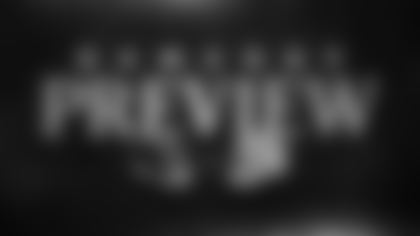BALTIMORE RAVENS PRE-DRAFT PRESS CONFERENCE
GENERAL MANAGER/EXECUTIVE VICE PRESIDENT OZZIE NEWSOME, HEAD COACH JOHN HARBAUGH,
ASSISTANT GENERAL MANAGER ERIC DECOSTA & DIRECTOR OF COLLEGE SCOUTING JOE HORTIZ**
As hard as it may seem for some of us to believe, this is the 20th draft coming up. We hear from players all the time, they talk about how they have to prove themselves game-in and game-out, year-in and year-out. When this time of year comes around, despite the mostly positive track record you do have, do you guys feel the need to prove yourself year-in and year-out when it comes to this? (Joe Platania)
*(NEWSOME) *"I guess I will begin by saying each year is different. And we have 65, possibly 66 players with another deal I'm close to right now … What we have to do is supplement the 65 guys that we have, and the draft allows us the opportunity to do that and even more so this year because we will end up with 10 picks. So, that's where the pressure is. The pressure is to supplement the team so that when we get to August, end of September, that we are ready to play at the beginning of the year."
A question for Joe and Eric: Last year when we talked about the draft, the cornerback class was not a very strong class. I think I recall you saying that other than the first couple of rounds, it was going to be tough to find quality later on. Is this year's cornerback class more beneficial and do you view a lot more options there available for this year? (Jeff Zrebiec)
*(HORTIZ) *"It's a good year, I'd say, for the corner class. You're going to still, like every year, get a run on corners in the top three rounds. We face that every year. No matter how many you have up there, you're probably going to lose about 12 guys in the first three or four rounds. What we do have is we think there are guys – obviously the top guys like [Trae] Waynes – that are going to probably go early, and then you are going to be looking at [Marcus] Peters, [Jalen] Collins, Kevin Johnson, all those guys will be in the mix toward the latter part of the first round, second round. We feel like there are guys at each level of the first four rounds that we feel like we will have a chance to consider."
For Ozzie and Eric, considering how much goes into this process of drafting players, the investment the organization is going to make, how much has changed in the vetting process of the prospects and how much league-wide do you have to keep up with when you talk about having to find out what these guys are like, not only on the field but off the field? (Brett Harris)
(DeCOSTA)"Honestly, we don't do a lot of things different than we did 10, 15 or 20 years ago; it's the same process. What we do is we trust our scouts and our coaches. We have a lot of connections at different schools, and we try to generate as much information as we can. We get a chance to meet with these guys at the Combine, here in Baltimore, at the All-Star games, and we build a profile. We're fortunate that we have a support staff here, people like Harry Swayne and our doctors, who have a chance to provide feedback to us as well .We get a sense for the player as a player and as a person, and we just rank everybody and make a pick. It's not rocket science. We try to make it science, but it's not rocket science. It's more instinct and doing your homework, your due diligence and making good decisions."
Two players who are rumored to be maybe falling down in the first round because of character issues – Marcus Peters and Dorial Green-Beckham – what is your comfort level with those players considering their issues? (Jamison Hensley)
*(NEWSOME) *"We've had both of those guys come to Baltimore, and we've been able to do additional work. We will spend next week with basically our third set of meetings with the scouts, and coming out of those meetings we will have a better idea of where players will rank as far as our board is concerned. But, they both have been in the building."
Ozzie, you have 10 picks. Do you look at it as trade fodder, or is it something when you go into a draft you always make a trade? Do you look at it as fuel for a trade, or do you look at it as a potential for taking 10 guys who can help this team? (Dave Ginsburg)
*(NEWSOME) *"It could go either way. It's how the board starts to come off as to whether we will use some of the picks that we have to move up or we come away with 10 or maybe even more by moving back. It's based on what will happen in the first 25 picks and what will happen in the first 50 picks [that] will determine how we will react on Day One or Day Two, even Day Three."
Ozzie, I think last year you said you would take a receiver if you saw at some point the board was stacking that way. Is there a position you look at this year and say we will draft a player at that position at some point over that weekend? (Garrett Downing)
(NEWSOME) "No, because I'm not going to ever make that statement again, because I got caught in the seventh round and we ended up getting ..."
(HARBAUGH) "Making a trade?"
(NEWSOME) "No, that is not why we made that trade. No, we will set the board, and we will take the players as they present themselves to us."
Ozzie, with this being your 20th draft leading the Ravens, how has the process evolved or changed for you over the last 20 years? (Brett Hollander)
*(NEWSOME) *"Not a whole lot for myself. I try to do the most listening of anybody in the room, because I still believe that the information makes your decision. So, it really hasn't [changed]. But what has happened is that there is a lot more information available – not only to scouts, but to you in the media, to Steve [Bisciotti], to John and to the coaches, and I just try to sit back and be a sponge and gain as much information as I can. Hopefully that puts us in a position to make picks. But not a whole lot has changed."
When you look at the wide receiver class, do you see a lot of guys who may be ready to play early in their NFL careers? And how important is that for you guys if you pick someone who is considered ready and doesn't need a year to learn a lot and get polished before they can contribute? (Aaron Wilson)
*(DeCOSTA) *"It seems like receivers in general have been contributing faster over the last couple years. Last year's receiver class was outstanding. We want all our guys to contribute right away. Our goal is to bring guys in here that dress and play, and if we're not doing that, we're not doing a very good job. It is a good class. There a lot of different players, and we think we can get a good receiver in a lot of different rounds. Fortunately, there are some really talented guys, and hopefully we can get one."
With regard to corners, how – evaluating this year's draft – do you look at corners as far as being maybe somebody who can contribute either at corner or at nickel? A lot of people talk about drafting size now at corner for bigger receivers. Has your philosophy changed at all about looking for receivers with size at all? (Cliff Brown)
*(DeCOSTA) *"Last year we could have used about any corner in this draft. *(laughter) *But we've looked at the corners, and we think it is a pretty good class. They come in all different shapes and sizes. Some guys play outside, some guys play inside, some guys can do both. Some guys are big, some guys are small, some guys are fast, some guys are good with their hands. You want guys that are tough, you want guys that have ball skills, and you want to know what they can do for you. Obviously, there are bigger receivers in the NFL. We like big guys. We've had success with bigger corners, but we've also had some success with smaller guys. So, we want football players. We want guys that bring something to the table for us in Baltimore, and they've got to be fast, they've got to be tough, they've got to be coachable, smart, tough, disciplined and durable. Those [traits] are really what we look for."
How much is left to do from this point, three weeks before [the draft]? Is it just waiting for the draft at this point, or is there still a lot of work to be done when you go through the players? (Pete Gilbert)
*(NEWSOME) *"There's a lot of work. We will start on Monday with the scouts and the coaches being involved in meetings. It will be very intense. As I've said before, [there is] a lot of information. Coach will be in there. He has probably looked at 220-something guys, and he'll have a chance to have his input involved in it. These meetings that are coming up in the next week are probably just as important as any meeting that we have, because as we walk out of there on Friday or Saturday, our board will be pretty much set as to how we will approach the draft."
Over your years you've drafted 20-some wide receivers. There has been a lot of talk already about the position. How much pressure is there and do you feel on you to draft someone that will make an impact? So far, you have drafted a number of wide receivers, but none that have reached an elite status that have stayed with the organization. (Jerry Coleman)
*(NEWSOME) *"Well, if I were San Francisco right now and what I just paid Torrey [Smith], I would think he would make an impact for that team. Am I correct?" *(Reporter: "Well, that's debatable. Yeah, I think he made an impact to a degree.") *"OK. We draft players. We try, I try, but we as a group, we try to learn from all of our mistakes. How can we get better? What were we not looking at that led us to make that decision? And hopefully, it will make a better decision for us going forward. I don't know. The receiver position is changing with the size and the speed and the fact that more colleges are in a spread offense and they are throwing the ball. The receivers are getting more opportunities to catch a lot of balls. When I first got involved in scouting, you could probably go two or three games and the guy … I only caught 25 balls as a senior in college, but that game is changing, because the college game has changed. Receivers are coming into the league a little bit better prepared, and I think that will just help us do better. But I think Torrey had an impact in Baltimore for the last four years."
Eric, when you were talking about corners, you said the word "toughness" three times. I know that is something you look for, but it is probably one of the toughest variables to actually measure. How do you guys as an organization [measure toughness], because that is something important for any player. How do you ascertain who fits that, that you need, who might be a great player, but you don't know how tough they are? (Mark Viviano)
*(DeCOSTA) *"I think that's one of the tougher jobs that our scouts have. Coach Harbaugh has a tough team – tough-minded, we handle adversity, we play physical on the field and we're good in December and the playoffs; all that goes into it. You look for a lot of different things on tape. You look at guys that are playing just as hard in the fourth quarter of a blowout game as they would be in the first quarter of a tight game. You're looking for guys that tackle consistently on defense. You're looking for guys that play through pain, durable players that don't miss games because of injuries, that practice all the time even if they are banged up. A lot of times you have a chance to talk to the guy, and you can gauge his personality and his demeanor in an interview setting. Does he compete? Does he compete for the football? Does a smaller guy play big? Does a bigger guy play small? There are a lot of different things we look for. You've got a sense for it. You get a sense for it. It's nuance, but you get a sense for a tough guy when you watch them on tape, when you talk to a guy, you talk to his coach, you talk to the trainers, strength coach, all the various people. Does he compete? Does he compete in everything? That's what you look for in a player."
Along the lines of what Brett Hollander said, 20 years ago we asked you the relevance of the Combine – how important it was as opposed to what you saw on tape, what your scouts saw. Has that changed in 20 years? Is the Combine more relevant now, or is it still what you see on tape, what the coaches tell you? And why are your scouts so good? (Keith Mills)
*(NEWSOME) *"The Combine still has the same importance – getting the physical information. Three hundred and some players come, and we get all that medical information. That's huge to be able to get that done. And then the other thing we get is the opportunity to sit with a guy for 15 minutes. That has changed over the last four or five years. Ten years ago we didn't have that opportunity other than we had to chase down guys. So, those are probably the two most important things. What they do on the field, you're able to take the receivers this year and compare them to the receivers that came out in 1998 and 1999, because it's the same surface, similar surfaces, and what they were able to do. But it's a piece of the puzzle. Still how guys play is very important [and] what he shows on tape. But also the information that we get from academic advisors, from the strength coach and from the trainers and the different people that our scouts talk to on campus – it all becomes a part of the puzzle, and we use that to make a determination as to who we want to be a Raven."
You guys talked about the vetting process a little bit, but given the amount of players who have retired before their time this year, is that an added consideration that you are going to get guys that are going to be around and want to play more than just one year and want to play out their football careers? (Jon Meoli)
*(HORTIZ) *"That's a hard thing to pinpoint – what's in a guy's mind in terms of retirement. I think you get an idea when our scouts go into the schools about their passion for the game and their commitment to it. Obviously, there are a couple of cases this year where guys retired [what was] perceived [to be] before their time. I know the one, Patrick Willis in San Francisco, he's had a long career in my mind, and he has dealt with a lot of physical adversity and played through it, so I can't fault him. And [Chris] Borland, absolutely, he felt what he wanted to do, and you can't fault him either. So individually, I think guys make up their minds, but you can't predict it. You may get an idea of guys that don't love the game, and those guys our scouts aren't going to love. They don't have passion. That's one of the things we look for – guys who are passionate about the game, committed to it, have the desire to be around the facility, around practice, talking with the coaches. That's what we look for that leads to a guy who loves the game and is going to be around it for a while."
Joe there has been a lot of talk about the tight end class beyond Maxx Williams maybe not being a whole lot there after first or second round grades. Your assessment of the middle rounds of that group, and how many guys out there that could be attractive? (Luke Jones)
(HORTIZ) "There are a handful of guys that don't get the acclaim – every year that happens. Last year [Crockett] Gillmore wasn't a guy that was considered very highly, and he came in and did a really good job for us. I think there are guys every year that are going to be taken in the mid rounds. [Clive] Walford from Miami is a talented kid that will probably go in the middle rounds. And then below that there are going to be guys in the fifth and sixth round that end up helping their teams, whether they are blocking guys or receiving tight ends, but they will show up. We feel good about it. It's certainly not a real deep class. I think two years ago or three years ago there was a really deep class. This year it's probably on the lighter side, but there are guys that we can target in the mid rounds."
Ozzie, can you talk about the continuity that you guys had in the scouting department and also with your head coach and how important that has been to your success – just the relationships and how that has worked together to create so much success? (Ryan Mink)
*(NEWSOME) *"I think the strongest aspect of that is that we challenge each other. John challenges me, Eric challenges me, Eric challenges Joe, Joe challenges the scouts. John will be challenging the scouts next week. And I think that's where the strength comes in is that we all go in very open-minded willing to listen and learn, willing to get criticized. I get criticized, because I don't have scriptures on my tongue either. I think that's the strength of us. And then we have Steve who has some ideas, and he has his input also as to what he would like. But the ability for us to challenge one another, I think, is the strength of what we do."
A year ago we wondered about right tackle, and you knew about T Rick Wagner. Who are some of the guys that you're excited to see get an opportunity this coming year?* (Scott Garceau)*
(HARBAUGH) "I'm excited about our young guys. I don't know if I have the list right in front of me, in all honesty, but there's not one guy who I don't think who's going to be a good player. There's nobody who I feel like he can't play. [Michael] Campanaro, you take a guy kind of off the top of your head right there, and [Kamar] Aiken – you have the young receivers out there. Obviously, those guys are going to be challenged, and they need to take it to another level. We have a couple young corners in the program who it's going to be up to them, and they're big, long guys that can run around. We'll see how those guys do. I can't wait for the OTAs. That's when we'll start seeing what kind of progress they've made. Of course, the young defensive tackles, they're going to take it to another level. We have a young pass rusher – Steven Means is a guy just to throw out there – we'll see how he does, but there's not a guy in this room that probably knows who he is except for, maybe, the four of us. He's a guy that's going to be interesting to see how he develops. We're always bringing in young players. Guys are going to leave. We have to put guys in under those guys before they leave, and hopefully, those guys blossom at the right time."
We heard Ozzie a couple months ago say, "You know what, I'm not going anywhere. The day I don't walk in this room ready to be here, I'll leave," but I ask you – because every year it seems Eric's name comes up for jobs elsewhere – not from this building, but other people would throw your name around – what is it to you, Eric, that keeps you here and attracts you so much to working in this organization? (Bo Smolka)
(DeCOSTA) "My wife. *(laughter) *I get a chance to work with my friends. Every day I come in and work with my friends, and I think it's a relationship business. In the end, personal ambitions aside, all you have is really your reputation and your friends and your enjoyment in life. And I love Baltimore, the community. My wife is from Baltimore, I've been here 20 years, my kids go to school here, so it's great. I sit with these guys every day and give everybody a hard time, get a chance to play jokes on everybody every day, and it's just fun. I enjoy work. I enjoy coming in here. We have a great owner, awesome stadium and best fan base in the country, so what more do you want?"
(HARBAUGH) "Eric gets blamed for jokes he doesn't even pull off. (laughter) Two days ago, I didn't have any glasses here, so Ozzie was working out, and he made a mistake leaving his desk, so, I went in there. I knew he had extra glasses, because whenever he shows me a roster or numbers, I have to go in and he has to hand me his glasses. I figured he had a pair sitting on his desk, so I grabbed them, and I use them the whole day. I just knew he would think Eric took them, so I'd be safe. He told me later, 'Eric took my glasses again.' I sheepishly hand over his glasses." (laughter)
Speaking specifically about the first round, in the past you traded up for QB Kyle Boller, DT Haloti Ngata, T Michael Oher, QB Joe Flacco, but you haven't done that since 2009. Since then, you've sat and waited for CB Jimmy Smith, S Matt Elam, LB C.J. Mosley. Is that a function of feeling confident that those guys would be around at those spots when you picked, or is it about not having any one of those last three rated particularly higher than whoever else would be available at that spot? (Robert Klemko)
(NEWSOME) "I think it's a function of two things: As we start to get close to our pick, do we have three or four players that we really like, and they're probably comparable as far as talent is concerned. If that's the case, then there's not a reason why we should move up, because we feel like we'll probably get one of these players without having to give up a pick. We don't like giving up picks. Eric does not like giving up picks. But then there are other times … Michael Oher, we needed a tackle. We had been [getting rid of] tackles for every year, and Michael was coming down the board. To go up to get Flacco, we needed a quarterback. That's why we did it for Boller. So, there were reasons why we did it, and the other reason is we had multiple picks in those years just as we do this year. But what we'll do [is] we'll value the board, we'll watch it very closely, and as we get close to our pick if there's somebody that we really covet, then we'll go and get him. If not, we'll just value all the guys that are available to us."
Every one of those picks that you traded up for were cornerstone-type positions. You talk about cornerback, tackle, defensive tackle, so is that something that you just wouldn't do for, say, a right end or a safety? (Robert Klemko)
(NEWSOME) "I guess the one thing that I probably could say over the years is I don't like to pigeonhole myself and say, 'I won't do this.' I'm just not that way, because if a player is that good, then you go and get him regardless of position, because we feel like he will impact us over the course of his first four, five years that we would have him. So, I don't like to be pigeonholed and say, 'I will not go up and get this player,' because at some point I might do it."
What stands out about Shane Ray as an edge rusher? Is he a true defensive end? Also, with Randy Gregory, how much of a red flag is that when a guy admits that he smoked marijuana and failed the test at the test at the Combine? (Jim Corbett)
(HARBAUGH) "Well, it's timely. Ozzie came in … I was on the treadmill earlier than Ozzie today – Ozzie is in there early, man. We had a conversation about Shane Ray, which is kind of intriguing. We both like him. What jumps out first of all is his motor, right? This guy has an unbelievable motor. He's going to get plenty of NFL sacks just because he's going to keep coming relentlessly. And then he's a leverage rusher with subtle speed to work the edges. He can work the edge of an offensive tackle like few other guys. So, he's an interesting guy. The second part of it, that probably goes to Eric."
(DeCOSTA) "Everything matters. We scrutinize everything, every piece of information. Obviously, if a guy has a positive drug test, we talk about it. We don't do this in a vacuum. We consider everything, and we look at all the different facts of the matter. We talk to people, and we brought them in as Ozzie alluded to – I think you said that – but we brought them in, spent some time with them, and we've talked to a lot of different people. Does it affect players? Yes, it affects players when players test positive at the Combine. It affects them in a bad way, usually. But again, we don't treat anybody exactly the same. We consider all the different situations and circumstances, and we make a decision. And we're not there yet. We have a lot more work to do. We have meetings next week. We have a set of meetings after that, the last week before the draft. So, we'll talk about every situation that occurs and make decisions based on that." (Reporter: "[Randy Gregory] is still on your board, right?") "We haven't taken anybody off the board, honestly, because we haven't finished our meetings. Until we finish our meeting, which is – what is it Tuesday, I think, or the Wednesday before the draft – then everybody is on the board, because we haven't made any firm decisions."
Ozzie, we see teams do it every year trying to find their franchise quarterback. How much is QB Joe Flacco just the factor to make everything else work out better for you to not have that need? (Morgan Adsit)
(NEWSOME) "They must have had the treadmill bugged today, because John and I had that conversation also. It's hard to win in this league without a quarterback, and we were able to do it through the first Super Bowl because of Tony [Banks] and Trent [Dilfer], but it's hard. As I told John, it's probably at least a quarter, maybe half of the league that's looking for a quarterback right now to help their franchise. We got fortunate in Joe, and Joe continues to get better. Joe continues to mature. So, I'm glad to have Joe Flacco as a part of our organization as our quarterback. But it's a position that is hard to win in this league when you don't have one."
You said Steve [Bisciotti] had some input, obviously, for the personnel side. The issues that the organization has had with off-the-field issues, is the bar different this year? Has Steve said anything specifically about the way you draft players? You had a player drafted last year who was arrested in the first month. I would think you can't have that happen again this year. (Nestor Aparicio)
(NEWSOME) "I would hope that wouldn't happen again, but we will do any and everything that we can to make sure the 10, 11 or six, seven or eight players who we bring into Baltimore will hopefully stay out of trouble, and we'll probably do the extra work on that. But there's not a guarantee that it's going to happen. It's just impossible for us to guarantee that." (Reporter:"Has your philosophy changed at all?") "Well, we've had discussions with Steve. That was part of what we did when we were down in Jupiter to talk about what we would like our team to look like, what the character… And Steve is very, very open with John, Eric and I about players. He has been around players now for the 11 years that he has been the majority owner of this football team, so he has a true understanding of our players. He has sat in meetings and talked with players about behavior and things like that. Yes, we've had conversations. I would like to think that last year that bar was just as high, and Lorenzo [Taliaferro] got in trouble. But we will do our due diligence, and we will do everything we can, but I still cannot promise you that one of the guys that we draft may not get in trouble."
John, when you came here, Ozzie's reputation was already intact. Have you found that you're able to sway him on occasion, or do you really defer to his knowledge, because he has been doing this and doing it well? (Dave Ginsburg)
(HARBAUGH) "I would say both. Ozzie, to his credit … First of all, he's great at what he does, and that goes for Eric and Joe, and I would also say the team that Ozzie and these guys have built. Ozzie has been doing this for a long, long time, and he has built an organization, an operation and put the people in place and trained people and has just built something just incredibly special. That's our foundation, and that's what we lean on. That's how we're built in terms of putting our football team together, and that's a great, great advantage. But also, to his credit, he's not stubborn; he's not stuck in any method. He believes in improving and getting better, and maybe one of his greatest strengths is he talked about listening. Ozzie talked about listening, right? He listens and takes in all kinds of information and never feels like he has to make a point, never throws the trump card on the table. He's always willing to turn over every stone and try to come to the best decision, so he's always open to being swayed. I think he looks to be swayed, and that's a real plus for anybody."
With the league's emphasis now in looking at concussions maybe differently than four, five years ago, how much has that affected the way you look at a prospect that has had maybe one or two in college? Does that make him less likely to be draftable?* (Pete Gilbert)*
(DeCOSTA) "I think we defer to our doctors. Some guys have had some concussions. We trust our doctors. We take their opinion very seriously. We'll make decisions based off that. We're not doctors up here, but obviously, I think our scouts do a good job of getting as much medical information as they can in the fall. But really, until the Combine comes and we start to really get all the information about these guys, it's tough for us to really evaluate a prospect in terms of concussions and head injuries and things like that. But once we get the information from our doctors, we take their advice. If we have a question, we bring a guy in, we get some more work done on him, and we make a decision based off of that."
You haven't drafted an offensive player since 2009, and I know you're not going to just draft an offensive player just to draft him, but … (Jamison Hensley)
(NEWSOME) "In the first round?"(Reporter: "In the first round. The first three rounds, it has been more defensive than offensive players just because the way you've been selecting the best player available. But is there any concern that you want to invest as much in the offense as the defense and that hasn't been the case the past few years?") *"We take the best player. It was up until you said that that I didn't realize we haven't drafted an offensive player [in the first round] in three years, or three or four years. Since who?" *(Reporter: "Michael Oher.") "Since Michael Oher, wow. OK. I don't go in with any preference as to what side of the ball [we choose]. Sometimes there are more needs on defense, and the board is set up that way, so we tend to stay with the board. But I don't go in with any preconceived ideas that I'm not going to draft offensive players – I'm an offensive player myself – but I do believe you win with defense."
There's so much emphasis on the first two rounds. What is the key to success – and this organization has had it – in finding good players in the later rounds. What is the key to being good at that? (Mark Viviano)
*(HORTIZ) *"I would say it's the process that we go through with all the players. Our scouts do a great job of finding the guys – not only the first-round talent, the second-round talent – but the guys that would be good developmental-type backups that could come in and be an anchor guy on special teams, be a guy that could be your six-swing offensive lineman and become a starter down the road. They go out and find them, and then we bring our coaches into the process and it's really – while we get after it in there – it's a pretty good marriage between the two sides where we get in and talk it out, hash it out. We find the guys that our coaches feel can help us, and there's a commitment to the player on both sides that helps us develop them. I think it's the process that we put them through, seeing all the different exposures and really getting everybody involved in it."
With that said, the middle-to-later round guys that have really helped you out – Jarret Johnson and Rick Wagner, right now – is there a player or two who you're most proud of that you look back and say, "Man, that's what we do well, and he's really a guy who stepped up and did it when maybe a lot of people thought he wouldn't." (Keith Mills)
*(NEWSOME) *"I'm going to say this, because I've been given the task at the end of the draft: We want to change the pictures in the scouting wing, and one of the tasks is [deciding] who some of the players are that have overachieved on their draft status. And it's going to be involved, with myself and the scouts, to come up with a list of players for that wing. It's a fun thing, but it's hard for me to sit here and say to Jarret Johnson, 'Hey, you outplayed your draft,' because Jarret Johnson came in thinking he was a good football player and he just ended up getting drafted in the fourth round. But he thought he was a good football player."
John, how important is it to you to spend some time with these younger players coming in with character issues and some of the other stuff out there, to be able to sit down with them and spend some time with you? (Bill West)
*(HARBAUGH) *"It's very important. It's important before the draft, and we do that at the Combine on top of what our scouts do. Our scouts [provide] tons of information. But the four of us, and even Eric and Joe, have talked to these guys before they've come to Baltimore, but Ozzie and I, both at the Combine and in Baltimore, get a chance to really spend some time and talk to these guys. It's critically important, especially for the guys that are going to be drafted a little bit earlier. You want your early picks to be really high-character guys and guys who are going to be leaders. That's important that we try to find those guys, and then once you draft him, to get to know him and spend time building relationships with him and get inside his head a little bit to see what makes him tick and try to influence him a little bit, try to point him in the [right] direction as much as you can. Most of our guys do a great job with that, and we've just got to keep trying to do better with that."
Could you tell us who's eligible for the local workout? How is that determined, and what do you guys hope to get out of that and what have you gotten out of it in the past? (Scott Garceau)
*(HORTIZ) *"Our areas consist of the metropolitan Baltimore area, and we've also been given the [Washington,] D.C. area, too. Basically all the kids at Maryland and … What we do is an invite-only-type thing, and it's the scouts who have a feel for the player, the scouts that went in there. [It is] anyone who is from the area – high school, didn't necessarily have to have played college ball in the area, or play. That's the area it makes up. What we try to get out of it is an exposure to the players. It gives our coaches a chance to work them out one-on-one, interact with them, spend some time with them. It gives them a chance to come in here and see this facility and this organization. It exposes us to them and them to us. If it's a draftable player, like [Michael] Campanaro last year, he knocked it out of the park on our local pro day. That's probably one of the main reasons we picked him. But then other guys we bring in, we'll end up signing them to a post-draft free agent contract because of their performance here and our feel for them."
Might you make pictures for part of that wing for some of the undrafted players who have come through? (Jerry Coleman)
*(NEWSOME) *"Oh, yes. It would be any players that played for the Ravens, regardless of how they got here."
Coach, they're announcing a new female referee today. I know you'll say you haven't given it much thought, but … (laughter) *We've seen you get upset at officials before. Might your approach differ? *(Jerry Coleman)
*(HARBAUGH) *"Oh, no. We had [Sarah Thomas] in the preseason last year, and she did a good job. She might be one of the better ones we had, so it's about time. *(laughter) *Get these guys straightened out a little bit, and get some gals in there. We're looking forward to it. She's a good ref, so it was a good choice."
Ozzie, you mentioned in your opening statement that you were adding another player to get to 66. Is there anything you can expand on that? Are you talking about a free agent or a new deal? (Jeff Zrebiec)
*(NEWSOME) *"No, a player that was on our team last year. I will just say that. Re-sign a player, yes. Up until it's done, I won't say anything."
Ozzie, you talked about moving up in the draft and when you have an abundance of draft picks it's easier to trade them to do that. Is it more likely when you move up, is it for need or is it because a really highly-ranked player on your board has dropped down? (Stan White)
*(NEWSOME) *"It's the latter. If someone that near the end of the first round is probably in our Top 8 or 10 has slid down our board, than it would probably be for that reason. The value of picking someone in the 20s, where we would have been picking in the Top 10, we'd be happy to have him. So, that is probably the reason why we would move up to get a guy."
Ozzie, as much of a strong suit as the offensive line was last year, how much do you have to think ahead always and look at players this year that maybe they'll be free agents after next year with regards to drafting guys this year? (Aaron Wilson)
*(NEWSOME) *"We had that conversation at the treadmill today. *(laughter) *We have to win. I was talking with someone … But John and I have had this conversation … We have to win this year. That's the most important thing. The teams that don't win this year, then something normally gets changed – the general manager, the head coach, players – something happens. But if you win, you've got a chance to at least step up to the plate the following year. That being said, if some very good offensive linemen are there for us to draft, then we will take them. And because we've got some guys who are going into the last year of their deal, we realize that. And if we already have ready replacements for them, it makes it a lot easier on me in talking with John about who's the 'next man up.' It's a lot easier to say that."

















